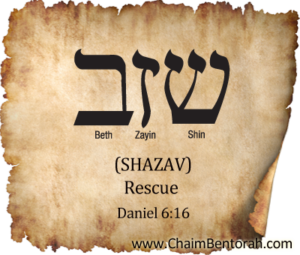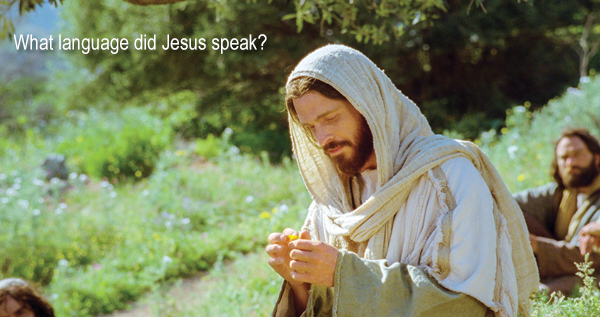Aramaic Word Study – Rescue – Shazav – Shin Zayin Beth
Daniel 6:16: “The king spake and said unto Daniel: “Thy God whom thou serves continually, He will deliver you.”
 In researching my doctoral dissertation I have come across something very curious which may serve to shed some light on King Darius’s statement to Daniel that God would deliver him from the lion’s den. This portion of the Book of Daniel was written in Aramaic which is very difficult to translate into another language. There are many variations we can use in arriving at an equivalent word in the English language for many Aramaic words. The writer uses a strange word for serve. The word in Aramaic is palak which in a noun form means a millstone. In its verbal form, it means to grind or cut up into pieces. It is possible that what King Darius is referring to is Daniel’s fanaticism, the God that you have ground yourself up into.
In researching my doctoral dissertation I have come across something very curious which may serve to shed some light on King Darius’s statement to Daniel that God would deliver him from the lion’s den. This portion of the Book of Daniel was written in Aramaic which is very difficult to translate into another language. There are many variations we can use in arriving at an equivalent word in the English language for many Aramaic words. The writer uses a strange word for serve. The word in Aramaic is palak which in a noun form means a millstone. In its verbal form, it means to grind or cut up into pieces. It is possible that what King Darius is referring to is Daniel’s fanaticism, the God that you have ground yourself up into.
Then he adds the noun bor which has the prefix beth which is the preposition for on or in and the suffix Aleph which is a definite article the. It means a circle or to dwell within the circle. What King Darius could possibly be referencing is that Daniel has allowed God to ground him up into his little circle that there was no hope of his seeing any other way. There was just no possible way that Daniel would serve any other God.
But then he adds something very enlightening. He says that God will deliver him. The Aramaic word used here is shazav which means to rescue or deliver, but it is a deliverance made out of love and affection. King Darius is saying that if your God loves you so much, He will not let you suffer this fate. Oh, but there is more embedded in this word. It is in a Peil Imperfect form. Hebrew does not have a reflexive form for the Piel stem, but Aramaic does. The Peil is a combination Piel (Intensive) and Hithapael (reflexive). What King Darius is saying, if we are true to the grammatical form of this word is: “The God that you have totally committed yourself to will deliver you to protect Himself. In others, it would be a major embarrassment to God if he does not rescue you from these lions.
Looking unto Jesus is not just looking at him but making yourself transparent to Him as He makes Himself transparent with you. It is like a bride and groom looking at each other as they commit themselves to each other for the rest of their lives. At that moment they become transparent, sharing something with each that they will not share with anyone else in the world.
The wedding motif actually carries on through this entire verse. Jesus endured the cross and the shame associated with the cross for the joy that would result from it. He did it not only for us but for the joy that the sacrifice would bring to Him. Just as the bride and groom sacrifice their personal lives and their singleness for the joy of being together. Yet, that word joy is an amazing word to use here in this passage. It is the word chadotha in the Aramaic. This is the word used for the joyful dancing at a wedding. This again carries that wedding motif. The vows have been said as we and Jesus gaze at each other sharing our vows. We tell Jesus that we are giving Him our lives and our hearts and now we enter that wedding feast where there is a wedding dance. In the traditional wedding dance couples line up opposite each other. Depending on the culture and whether traditional orthodox or not either men and women face each other or members of the same sex face each other, the symbolism still remains the same. They then move toward each other and then back away, always chor, gazing at each other, never taking their eyes off each other. Each time they back away, they move back to each other only this time drawing closer to each other. This is to declare that the bride and groom will have times when they will struggle in their marriage and they will momentarily separate from each other, but as they look chor or gaze at each other they will be drawn back to each other only this time a little closer. This is what the Apostle Paul is describing in this wedding motif that we will dance this wedding dance. It is a joyful time of expressing our commitment with Jesus and He with us. Even though we may sin and draw away from Jesus, He will always keep His gaze on us and we will be drawn back to Him only each time we return we will be drawn closer to Him. Jesus will use our human frailties that the enemy would seek to use to draw us away from Him only Jesus will use it to bring us closer to Him.
So we have the wedding ceremony where we gaze at Jesus in transparency leading us to the joy of the wedding dance and now the groom takes his place at the right hand of the Father at his daqurasih in Aramaic from the root word quras which is a chamber with an upholstered chair or a divan, what we call a love seat, that is a chair made for two people to sit closely together. It could also be a bedroom and the way the syntax word suggests we could read this as the bedroom in His Father’s house. This is where the groom Jesus would take us His bride to consummate our marriage to Him.
So next time you hear this verse, stop and consider that the Apostle Paul might be sharing something even more intimate than we the surface understanding of this verse indicates. It is also speaking of our marriage relationship to Jesus and the intimacy that He longs so much to have with us that he endured the suffering of the cross in order to obtain it.
Hi there! Thank you for reading this Daily Word Study. Can I ask a favor? Share this Daily Word Study with your friends on Facebook and Twitter by clicking one of the icons below.
Thanks & Blessings, it means a lot to me!








He has always done this dance with me. I just had no words to describe it. Even my reading of this, and the exact timing of my reading of it, was arranged by Him. He knows I love that. I am anxiously awaiting Him taking me to His Fathers house.
So beautiful made me cry with joy and I shared with my grandchildren